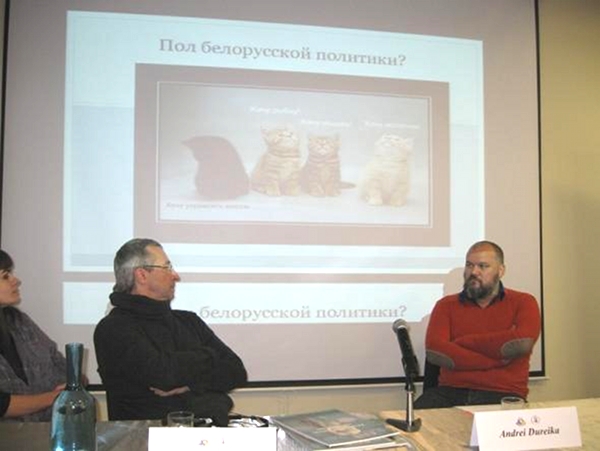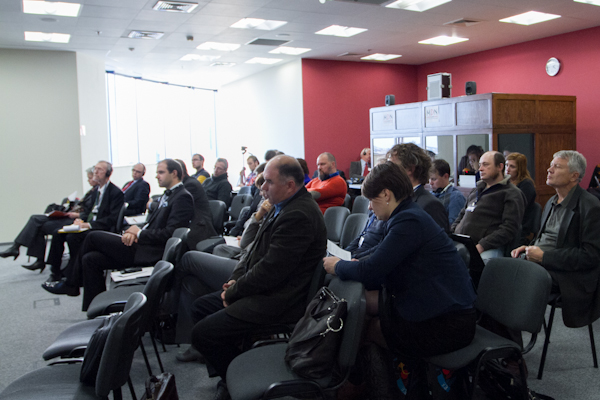Belarusian civil society: get rid of inferiority complex
- 31.10.2012, 16:39
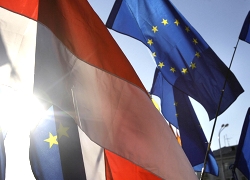
On October 26-27 Warsaw hosted the conference The State of Civil Society in Belarus.
The conference was held by the European Council and the Casimir Pulaski foundation.
President of the Council of Europe Conference of International Non-governmental Organisations (INGOs) Jean Marie Heydt told charter97.org, that the civil society has the capacity to change the political situation in Belarus, and that no other force can lead to positive changes.
“There are many examples in the world, like Egypt, Tunis, Libya, where democratic changes in the society happened only due to the civil society. And even though the situation in Belarus may differ from the situation in Libya or Egypt, the processes that are taking place in the countries are similar. I believe that everything is possible, and the Council of Europe will continue its support of the Belarusian civil society,” Heydt pointed out.
The President of the INGOs Conference emphasized that the civil society in Belarus is developing, even though the development is rather slow. But since NGOs will thrive only in a democratic society, democracy becomes the key goal.
“I receive delegations of Belarusian NGOs on a regular basis. In Strasbourg, democratic activists and representatives of the Belarusian civil society are always welcome. I do realize that a lot has already been done, there is some progress, there are things that make me hope for the best. But we can achieve our goals only in a democracy. Democracy is known to be a state form that demands most efforts; it is also known to be the most just system of all the systems that exist in the world. Democratic values never change, and they help us to work today. Democracy is directly linked to human rights, freedom of expression and responsible actions. And I hope that we will create a better future for the civil society in Belarus. We all know that the civil society gives us hopes, allows us to act when we notice some governmental limitations,” Heydt said.
The European official emphasized that the Belarusian civil society’s key problem is the inability to meet, talk, and express one’s thoughts freely. The country’s key problem in its turn is the existence of political prisoners.
The conference became the platform for a number of discussions: Belarusian Civil Society after the Elections; Social changes in Belarus; Situation with NGOs in Belarus; Mass Media and the Internet as tools of civil society; Where is the center of gravity of the civil society?
According to philosopher and head of the Council of International Consortium EuroBelarus Uladzimir Matskievich, social activists cannot separate their activity and politics:
”Aristotle defined politics as an art of common affairs. Politicians deal with our common affairs: taxes, wellbeing, national situation, orientation and so on. And we should leave the old-fashioned perception of politics as a job for a limited number of people, who, for some reason, have more rights to decide than the others. This is a philosophic, worldview thesis. In practice, I can see a number of negative things through this thesis. If you think that you can protect a tree, help a child or a handicap to cross the street, that this step can make you a respected person who brings order, who improves the life of the country, you’re wrong! Do you have time to help other children walk across the street? When you save a tree, lots of other trees are destroyed somewhere else. All these minor things only make you calmer and your consciousness cleaner. If we really care about children, elders, trees, we must make principle decisions. And that means that we cannot let the enemies of our children to ruin their lives; we cannot let dealers get best construction lots through bribes instead of constructing cheap and efficient buildings. Eventually everything becomes politics. And stop living with the illusion that you’re beyond politics. Even in the Soviet Union people knew Lenin’s principle: if you’re not interested in politics, politics will be interested in you. Natallia Radzina has been in prison, I would say she was in prison because she was a subject of a “case”; but people who didn’t care for politics were taken together with her. It was the politics who grabbed the people on their way to meet with children and handicaps. This example from the real life shows that you cannot ignore politics, and that everyone who says that the civil society should not be involved in politics is a liar and demagogue. We’re all very deep in politics.”
Editor-in-chief of charter97.org Natallia Radzina urged the mass media, civil society and the regime’s political opposition to leave the survival mode and to embark on “actual resistance and struggle”.
“Let’s be honest, there is no freedom of speech in Belarus. Some media and journalists make heroic attempts to inform about what is actually going on in the country, despite repressions and pressure from the special services. The independent media, civil society, political opposition all exist in a survival mode. Everything which can pose a real risk to the powers is destroyed. They began with destroying independent TV and radio, then they moved to the press and they finished with the Internet. The fates of the charter97.org journalists are a typical example. Our experience is a warning to everyone. If you don’t play according to the regime’s rules, they’ll crush your office, start criminal cases against you, there’ll be murders and arrests. The journalists who live in Belarus and write the sharpest texts – Iryna Khalip, Andrzej Poczobut – are condemned and risk new prison terms. The papers “Narodnaya Volia” and “Nasha Niva” constantly receive warnings; the powers threaten to shut them down in the near future. All mass media, even foreign, are exposed to blackmailing and control of the KGB, because they must be accredited by Lukashenka’s foreign office. In this situation the West must act in the following way. First of all, the independent media that work in the country and are exposed to pressure and censorship need support. Secondly, the media that work for Belarus from abroad (Belsat, Charter97, Radio Racja, Euroradio, Radio Svaboda) should be supported and developed. And finally, we need transmitters installed at the boarders to broadcast via FM-stations. But the most important thing is that everyone should switch from the survival to the fighting mode.
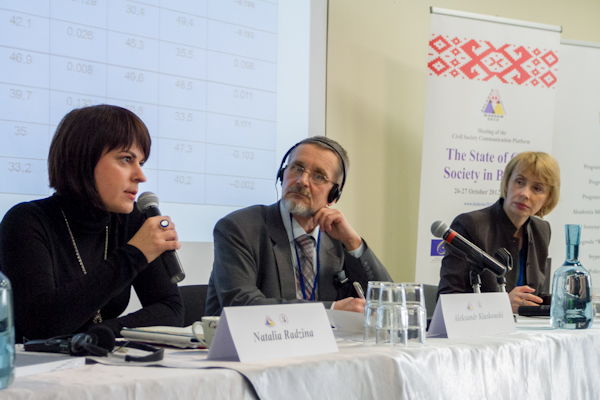
Director of Euroradio Dzmitry Novikau believes that the most important today is to stop compete with each other, and unite instead:
“I don’t consider myself an emigrant, my family moved to my place in Warsaw for a bit more than a year ago. My Polish colleagues who had no interest in politics often ask me: “If Lukashenka is so stupid, how can he be the ruler during all these years?” For me, this is the key question. The answer is that, when speaking about Lukashenka and his politics, we place wrong emphasis. Yes, we do say that it is easier to work from here and that we’re not allowed to work in our country. But let’s not forget that the total control of the special services is not limited to the territory of Belarus. Don’t forget about the Belarusian intelligence, it’s working just fine. But I would not demonize the Belarusian special services, they are not as good as they seem. Luckily they didn’t break my arms, force me to stretch, but basing on my personal experience I can say that the special services mostly intimidate. Those who got scared can be broken. Obviously, everyone has certain points that can be pressed, and we cannot judge those who broke.
Let’s take the media. The number of opposition media is minimal: there is the online phenomenon of Charter97, there is only one TV-channel, only three independent radio stations. This is ridiculous! In the current international financial crisis we need facts. The same concerns political institutions and processes. Everyone should get a place in the collective decision-making.”
Coordinator of the civil campaign European Belarus, former political prisoner Dzmitry Bandarenka remarked that there is something that the Belarusians who live in the dictatorship be proud of. However, it is crucial to be successful in what you do:
“The topic of our section was Where is the gravity center of the civil society? It is definitely in Belarus. Where else? During the conference, someone mentioned the concept of ”minor deeds” and ”minor victories”. If I compare the modern Belarusian society with the population of the BSSR in the 1970s, I can say that we’ve made a significant progress since that time. I don’t think there would be a hundred of people who both spoke Belarusian and knew the history of Lithuania-Belarus at that time. Today there are hundreds of thousands of such people. And I think that today the Belarusians should just do their thing. We must promote Belarusians all over the world. For example, the Belarusians who live in Warsaw, that used to be the capital of our common state, should win the city – in a good sense. The Belarusians who live in Vilnia, another ancient common capital, should become an example for everyone else. And the same goes for the Belarusians of Moscow, Kyiv… But what is “minor victories”? Personally I am proud that the World Number 1 tennis player is Belarusian Victoria Azarenka. This is a “minor victory” of her family, who brought her up and sent her abroad to become a tennis player. Today Azarenka lives in Monaco, but the whole Belarus is proud of her. I am proud for the BATE football team – football, not ice hockey. The players from Barysau have become Belarusian champions several times, and they even played in the Champions league group stage three times. Polish clubs have never been there. We have the Free Theater, talented artists. Artist Andrei Dudeika told me that already now we can talk about a “Dusseldorf Belarusian school of art”. And Belarus today is our brands – Ploshcha, Shushkievich, Free Theater, Radio Svaboda, Nasha Niva, Charter97, Lyapis Trubetskoy…
It is crucial now to be successful in what you do. If you are successful, you are respected. And this is what Belarus will be. Today, due to the Internet and other information technologies, Belarusians who live in their country or abroad can remain Belarusians, and can be a part of Belarus. And despite everything, I am still an optimist. Firstly, they don’t kill us they way they used to. Secondly, they don’t exile us to Siberia where Belarusians disappeared with no trace. When Vasil Bykau died, several dozens of thousands of Belarusians came to take their farewell. They came themselves; they hadn’t been invited. And there, I saw numerous people who had taken part in the first demonstrations of the Belarusian People’s Front. And I thought: these people remain Belarusians, and they foster their children to be Belarusians.
We must get rid of the inferiority complex. The Belarusian issue doesn’t concern our people only; it is a complicated international problem. We can only overcome the dictatorship together with the international community. Today the entire region is being “lukashenkanized”, and the aggressive Russian empire is being restored. So we must have strong international partners. We cannot have an inferiority complex. I noticed that a lot of Polish heroes are the people who simply fought. They didn’t win, they just fought – Tadeusz Kasciuszka, the heroes of the revolts of 1831, 1863, the Warsaw rebels from 1944. In Poland, they are not afraid to call someone who lost a hero. Historians will evaluate our generation. But let me say it once again – compared to the 70s, we have settled down, we have become a nation and a state. And for me, this is the most important thing.”
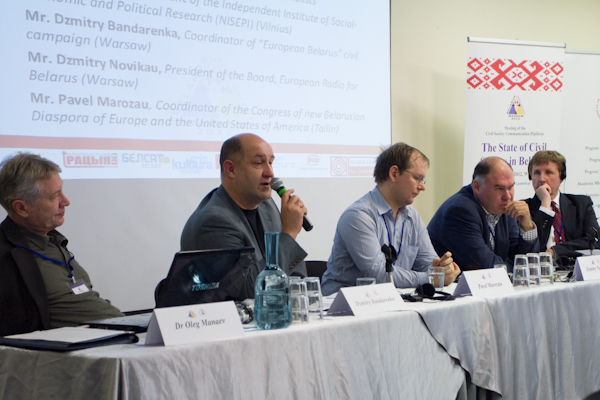
Director of the Eastern-European school of political research Aliaksandar Dabravolski suggested a new perspective of the relations of Belarus with Europe and Russia:
”Many projects that we’ve started failed, which should make us think that we must take a fresh look at the situation from aside. For many years Europe, the Belarusian civil society and the political opposition have been struggling to change the situation in Belarus, but no changes have happened so far. Let’s start where we are. When someone from Belarus arrives to the Council of Europe and gets a map, they are shocked. Belarus is the only country on a huge geographic area that is not a member of the Council of Europe. On the Council of Europe’s map, our country is shaded, which is rather symbolic.
There is one problem in the way our political elite think. Their linear thinking “East-West” deprives the power, society and the entire nation of the possibility to consider other ways to act. The line “East-West” includes several roles. What can Belarus be? 1. A part of the West. 2. A part of the East, Asia, Eurasia. 3. A bridge. 4. A middleman, an interpreter of meanings. In other words, the third and the forth roles are beneficial for Belarus if the East and the West conflict with each other; however, this is an uncomfortable position. This linear thinking brings about a range of problems, but unfortunately, most of the people in the world think of Belarus only within these two categories. New opportunities would give us new horizons. The northern and southern vectors are strategically important to escape from these jaws. The real situation is that we are on the conflict line between the East and the West. Some people say this is a civilized conflict, but I’d like to say that it is very profitable for the Russian political elites.
We are in a situation where Russia is unwisely attempting to find a foe in the West, thus putting Belarus in an uncomfortable position, because the Belarusians are not interested in conflicts with their neighbors. And Belarus cannot fully accept the alternative to the cooperation with the West that Russia can suggest. Even though the Belarusians consider themselves close to the Russian people, I don’t think they will choose the Asian alternative. So potentially, the conflict between Russia and the West makes Belarus choose between Europe and Asia. This is a dangerous situation for Russia, because as a matter of fact, Belarus doesn’t want to make this choice, and if Belarus is forced, I believe that the European identity can prevail, since despite their love to the Russian people, the Belarusian don’t feel a strong connection to Asia. Europe doesn’t demand anything of that kind from Belarus, and I think that this is rational position.
Nevertheless, Belarus will have to choose. But today the Belarusian powers still haven’t made any choice yet. They are trying to seem pragmatics, simply to get a profit here and there. But the Belarusians still haven’t answered the question who we are and where we are. Polls held at different points of time show basically the same picture; there have been fluctuations, but the Belarusians want to cooperate with the East and the West. We can argue that this shows infantilism, pragmatism, but actually this is a mere unwillingness to start a conflict, and to take part in others’ conflicts. The relations with Europe are an acute problem for the Belarusians. This bipolar thinking decreases the chances to maneuver, and a conflict with the West threatens Belarus’ independence. The powers do realize this fact. But Europe is based on certain values, and its basic conditions are to release the political prisoners, to stop repressions and to abolish the death penalty. All these conditions will remain; however, the release of the political prisoners and termination of repressions are more crucial problems that the abolition of the death penalty. Europe’s goal is a balanced cooperation with a civilized European country. This goal doesn’t threaten Belarus’ independence, but is considered a threat to the regime.”
